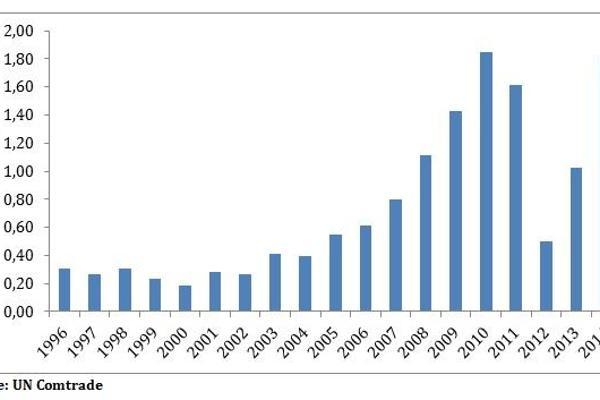How have Gaziantep’s exports to war-torn Syria quadrupled since 2011?


It is true that the number of Syrian refugees has reached around 2 million, and we are now expecting more from Aleppo, as Russian bombing displaces more people. As it becomes clear that this is not a short, or even medium-term crisis, Ankara needs to devise a mechanism to integrate Syrians into Turkish society. So far it has failed spectacularly. Yes, Turkey has built some of the best refugee camps in the world, but it has been blind to the substance of the problem.
Many Syrian refugees are here to stay for a long time, but they don’t have the right to work and earn a living for their families. They struggle to find viable education for their children and can’t navigate a country where they don’t speak the language. Amid the state’s negligence, however, ordinary Syrians and Turks are finding their own solutions.
I think the thriving Turkish export sector to Syria is an excellent indicator of this. Turkish exports to its southern neighbor peaked at $1.9 billion in 2010. They then dwindled to $1.5 billion in 2011 and flattened to $500 million in 2012, as the civil war worsened. Yet in 2014, Turkish exports to Syria bounced back to their pre-2011 levels. Not bad. But how did this happen?
It turns out that Turks started establishing partnerships with Syrians all around the country. In the last two years, 1,000 firms with Syrian partners have been established in Turkey annually. Between 2010 and 2015, the share of newly established Syrian-partnered firms among all new businesses has increased from less than 1 in 1,000 to roughly 1 in 40. The increase in exports to Syria is therefore not a coincidence.
But this is happening everywhere in Turkey. What are the top five provinces in terms of Syrians-partnered firms among all newly established ones? In 2014, these were Kilis, Gaziantep, Mersin, Hatay and Yalova. And the top five provinces exporting to Syria in 2014? Gaziantep, Ankara, Istanbul, Hatay and Mersin.
Interestingly, Istanbul’s share in Turkey’s exports to Syria declined from 41 percent in 2011 to 24 percent in 2014. Meanwhile, Gaziantep’s exports to the conflict ridden country quadrupled from $96 million in 2011 to $360 million in 2014. This increase carried Gaziantep to the top in the ranking of cities by their exports to Syria. That is important because Turkey’s exports are too often dependent on the Marmara region. So partnering with Syrians is not only good for rebuilding Turkey’s broken trade links, but also spreading the wealth around the country.
The Syrian civil war has been devastating for the Syrian people, and there can be nothing to offset their tragedy. The economic story is testament to their will. Looking at Turkish-Syrian trade numbers, we see that the war was most destructive at the outset, and is now creating a new equilibrium.
Syrians and Turks have adjusted to their new environment and are working toward a common future. They are not waiting for any government, but finding their own ways to provide for their communities. To me, this process is looking increasingly similar to Turkey’s past urbanization experience. It was human interaction - a la Hayek - and not human design that led to Anatolia’s urban transformation. Back then, it was the political machine looking for additional votes that facilitated this demographic shift. This time around, it is our functioning market economy that is doing the heavy lifting. There are no traces of a central planner in either case.

